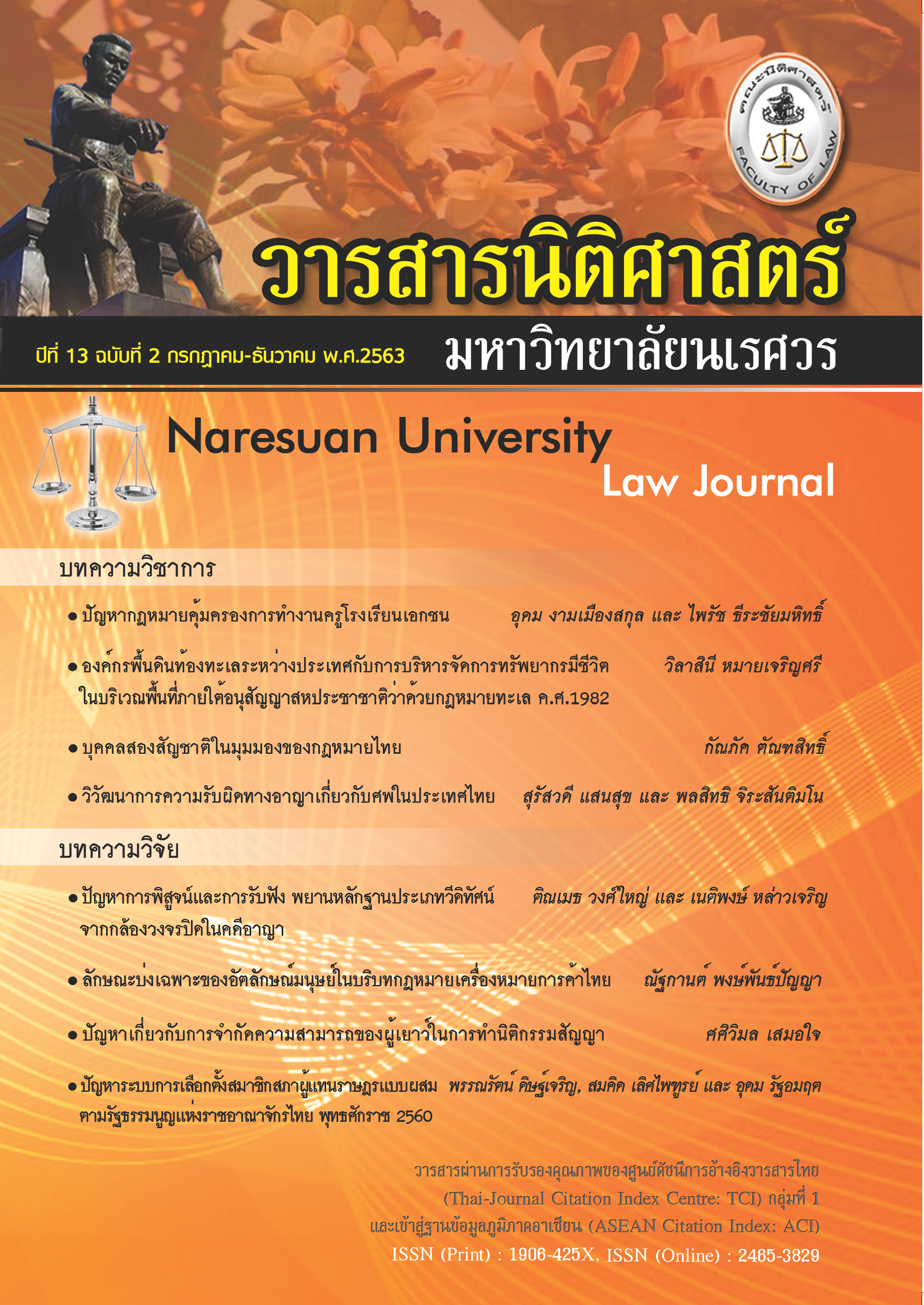บุคคลสองสัญชาติในมุมมองของกฎหมายไทย
Main Article Content
บทคัดย่อ
กฎหมายระหว่างประเทศยอมรับว่าการที่รัฐกำหนดสัญชาติให้แก่บุคคลในสังกัดของรัฐเป็นกิจการภายในของรัฐ รัฐแต่ละรัฐเป็นผู้กำหนดการได้มาและสูญเสียไปของสัญชาติของบุคคลซึ่งเป็นคนชาติของตน โดยรัฐอื่นจะเข้าไปสอดแทรกมิได้ ดังนั้นเมื่อเกิดการทับซ้อนของเกณฑ์การให้สัญชาติของแต่ละรัฐ จึงทำให้เกิดบุคคลสองสัญชาติขึ้นมาได้
การพิจารณาให้สัญชาติตามกฎหมายไทยบุคคลจะได้สัญชาติเมื่อเกิดตามหลักสืบสายโลหิต (jus sanguinis) และหลักดินแดน (jus soli) และอาจได้สัญชาติภายหลังจากการเกิดโดยการสมรส หรือการแปลงสัญชาติ ซึ่งอาจทำให้เกิดบุคคลสองสัญชาติขึ้นมาได้ เนื่องจากกฎหมายไทยไม่ได้มีบทบัญญัติห้ามถือสองสัญชาติ
บทความนี้ จึงมุ่งศึกษาเกี่ยวกับบุคคลสองสัญชาติภายใต้มุมมองของกฎหมายไทย โดยแสดงให้เห็นถึงหลักกฎหมายไทยเกี่ยวกับสัญชาติ นำเสนอปัญหา และข้อเท็จจริงที่เกิดขึ้นในประเทศไทย และมีข้อเสนอแนะให้แก้ไขพระราชบัญญัติสัญชาติ พ.ศ.2508 เพื่อป้องกันไม่ให้เกิดบุคคลสองสัญชาติจากการเกิดและการแปลงสัญชาติ
Article Details
เอกสารอ้างอิง
Baron, Paula and Allan Ardill. “Changing Citizenships.” Griffith Law Review 19, no. 3 (2010): 353-354.
Brownlie, Lan. Principles of Public International Law. 6th ed. Oxford: Oxford University Press, 2003.
Craig, Forcese. “A Tale of Two Citizenships: Revocation for Traitors and Terrorists.” Queen’s Law Journal 39, no. 2 (2014): 551-586.
Funston, John. “Malaysia and Thailand’s Southern Conflict: Reconciling Security and Ethnicity.” Contemporary Southeast Asia 32, no. 2 (2010): 236.
Glazer, Nathan. “Dual Nationality: Threat to National Identity, or Harbinger of a Better World?.” Procedia Social and Behavioral Sciences 2, (2010): 6813-6821.
H. Legomsky, Stephen. “Dual Nationality and the New World of Multiple Allegiances.” In Defense of the Alien 24 (2001): 7-13.
J. Spiro, Peter. “Dual Citizenship as Human Right.” International Journal of Constitutional Law 8, no. 1 (2010): 113.
Jaturon Thirawat. International Law. 3rd ed. Bangkok: Winyuchon, 2555. [In Thai]
Jiraporn Ngamlertsuporn, Peeraporn Kaewrattanakorn, and Tassama Phothidee. Dual Nationality: Security Impacts Along Thailand-Malaysia Border. Bangkok: The Thailand Research Fund, 2550. [In Thai]
Lee, Chulwoo. Report on Citizenship Law: The Republic of Korea. European University Institute, Italy, 2017.
Maastricht University. “Global Dual Citizenship Database.” Accessed May 5, 2020, https://macimide.maastrichtuniversity.nl/dual-cit-database/.
Ministry of Foreign Affairs of the Kingdom of Thailand. “The Official Visit of the Prime Minister of Malaysia to Thailand.” Accessed May 11, 2020, http://www.mfa.go.th/main/en/news3/6885/95778-The-Official-Visit-of-the-Prime-Minister-of-Malays.html.
N. Shaw, Malcolm. International Law. 6th ed. Cambridge: Cambridge University Press, 2006.
Nationality Decrees Issued in Tunis and Morocco, Advisory Opinion, P.C.I.J., Series B, No.4 (1923); W. Benedek, Nationality decrees in Tunis and Morocco, in Encyclopedia of Public International Law 2, Decision of International Court and Tribunals and International Arbitrations, North-Holland Publishing Company, 1981, 197-198.
Prasit Piwawatthanaphanit. The Principle of Private International Law. 5th ed. Bangkok: Thammasat University, 2018. [In Thai]
Rudko, Mykola. “Regulation of Multiple Nationality by Bilateral and Multilateral Agreements.” Paper presented at the 2nd European Conference on Nationality “Challenges to National and International Law on Nationality at the be Ginning of the New Millennium,” Strasbourg October 8-9, 2001.
Spiro, Peter J. “Dual Citizenship as Human Right.” International Journal of Constitutional Law 8, no. 1 (2010): 113.
Yamin, Priscilla. American Marriage: A Political Institution. United States: University of Pennsylvania Press, 2012.


